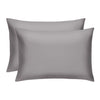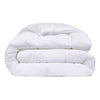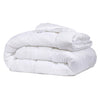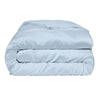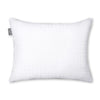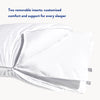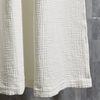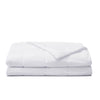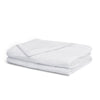The Daily Miracle
Why Do I Sleep So Much: A Deep Dive Into Oversleeping
Published
September 15, 2022
Author
Bridget Reed

Ever heard the term “too much of a good thing?” Well, you probably seldom hear it used about your sleep schedule, but you can, in fact, get too much sleep. Just as getting not enough sleep can affect your health, so can getting too much of it.
We’ve all dealt with that tiredness in our bones and constant fogginess, but we’re here to assure you the fix can be simple —- try logging the recommended amount of sleep instead of hours over. You may have thought that those extra hours of precious shut-eye and whimsical dreaming were beneficial, but they might actually be causing those inconvenient side effects.
We understand it can be hard saying no to your luxurious bedding anytime you get the chance, but it may be time to reevaluate your sleep (or nap) schedule.
Now, it's time to dive deep into excessive sleep and how it can affect your day-to-day life:
Am I Oversleeping?
Are you concerned you’re oversleeping? It’s super common. In certain cases, like jet lag, you might get too much sleep (or too little sleep) when adjusting to a time change. With sleep problems like these, you can try to regulate your sleep-wake cycles by regulating light exposure.
We can’t talk about sleep hygiene without mentioning circadian rhythms. The hormone Melatonin regulates your circadian rhythms — too much light (especially blue light from digital devices) could contribute to a lack of sleep.
What’s the Standard Sleep Time?
Days are long, and cat naps can become a part of your daily routine. If you’re clocking the recommended amount of sleep (seven to nine hours a day), you shouldn’t need those few hours of afternoon shut-eye.
If you’re logging at least seven hours of sleep each night, try to cut out any naps you take during the day, or even try to wake up a few hours earlier. Keep in mind that sleep needs differ by age and individual. Newborns may sleep from 14 to 17 hours a day, while older adults won’t need that much.
If you’re getting ample sleep but are still struggling with your energy levels the next day, your sleep might not be the cause. Low energy levels aren’t always a result of lackluster rest may result from factors like diet, hormone levels, and overall health.
Why Am I Oversleeping?
If your energy is shot during the day, it may prompt you to head to bed earlier or hit snooze a few too many times. Perhaps you have a “sleep debt,” if you couldn’t sleep the previous night, you might be tempted to extend your sleep duration the following, which can do more harm than good.
However, your constant desire for rest may have a name (and a solution.) Often, oversleeping results from misguided sleep habits and can be corrected with a minor tweak in your sleep schedule and lifestyle habits.
Here are four of the possible causes of your constant tiredness:
Hypersomnia
Occasionally, people who deal with oversleeping have a sleep disorder (or medical condition) called hypersomnia. Hypersomnia causes excessive daytime sleepiness and can be a total burden to bear. This sleepiness isn’t relieved by napping or added sleep and is usually accompanied by memory loss, anxiety, and low energy levels.
Specific lifestyle changes may help with your hypersomnia:
Get Out of Bed Immediately as the Alarm Rings
Even if every bone in your body tells you to stay in bed, once you’ve reached nine hours of sleep (max), it’s time to kiss that snooze button goodbye — it’s time to get moving.
Create a Tranquil Sleep Environment.
Turning your room into a peaceful space you love can be crucial to your sleep quality:
Use an essential oils diffuser. Essential oils smell delightful and have naturally soothing wellness properties. They’re often used to elevate spaces to a new level of relaxation. Essential oils like lavender, chamomile, and bergamot can help you sleep better and can even offer some mental health boosts.Obstructive Sleep Apnea
Sleep apnea is a condition that causes shortness or even loss of breath in the middle of your sleep cycle. This means even if you think you’ve gotten seven to nine hours of sleep, those hours may not have been the best quality, leaving you tired and exhausted.
Sleep apnea isn’t a curable condition, but there are specific things you can do to help deter the side effects of sleep apnea:
- Avoid sleeping on your back.
- Quit smoking.
- Use a CPAP machine (Continuous Positive Airway Pressure)
- Lose weight if overweight.
- Use a nasal decongestant.
Poor Sleep Quality
Even if you’re getting the recommended amount of sleep, it doesn't always mean you’ll wake up feeling well-rested and ready to take on the day — sometimes, no matter how much sleep you get, that constant drowsiness follows you everywhere.
Sleep quality plays a massive part in how you feel throughout the day: Eight hours of interrupted and poor-quality sleep isn’t equivalent to a restful, uninterrupted eight hours.
A multitude of things can cause poor sleep. Here are a few that may be affecting your beauty rest.
You have cold feet.
Having cold hands and feet while you sleep can be annoying and may be why you can’t seem to get a good night's sleep.
You’re too hot.
Like how being too cold can affect your sleep, so can being too hot. If your bedroom temperature isn’t just right, it can leave you tossing and turning all night.
Your body temperature changes while you sleep, so it’s best to get a Temperature Regulating Comforter to ensure whether you’re running hot or cold, you’ll be plenty comfortable.
You drank too much caffeine.
Even if you’ve drank caffeine in the past without it affecting your sleep, that may not be the case anymore. Yes, if there was a time caffeine didn’t affect your sleep schedule, it may have passed. As you age, caffeine can affect your body differently, which means what once worked for you, may not anymore.
Try avoiding caffeine after noon and see if you get better sleep.
Certain Medical Conditions
Many medical conditions can affect your sleep schedule and even cause you to oversleep. You’ve always been told that sleep deprivation will cause you the most annoyance, but sometimes the issue is too much sleep.
If you’ve been oversleeping and can’t figure out why, here are a handful of health conditions that cause constant tiredness and the need for more ZZZs.
- Depression and anxiety
- Hypothyroidism (underactive thyroid)
- Restless Leg Syndrome
- Chronic pain
- Insomnia and narcolepsy
If you have one (or more) of these disorders, they may be the culprit behind your sleep issues.
The truth is that they can all be challenging to deal with, but as long as you take them one day (or night) at a time and communicate well with your healthcare team, you can work on improving your sleep patterns. Some sleep disturbances, like Restless Leg Syndrome, can be uncovered with the help of a sleep study.
Say Goodnight to Oversleeping
From time to time, sleeping in is pleasant, and if you don’t do it often, it can feel like a real treat. However, if you’re seriously struggling to get out of bed in the morning, you may have fallen victim to a bad case of oversleeping.
Oversleeping is common and can usually be corrected relatively easily. But that’s not always the case. If you’re oversleeping because of an underlying medical condition or the type of medication you’re prescribed, contact your physician for the correct course of action. But if you’re oversleeping because your sleep schedule is a little out of whack, thoughtful steps can help you say goodnight to oversleeping, for good!
Sources:
Oversleeping: Bad for Your Health? | Johns Hopkins Medicine
Oversleeping Side Effects: Is Too Much Sleep Harmful? | WebMD
How Much Sleep Do We Really Need? | National Sleep Foundations
7 of the best essential oils for sleep in 2022 | Medical News Today
Melatonin: What You Need To Know | NIH
How to Get Over Jet Lag: 8 Tips and Suggestions | Healthline
Restless Legs Syndrome | Sleep Education by the AASM


